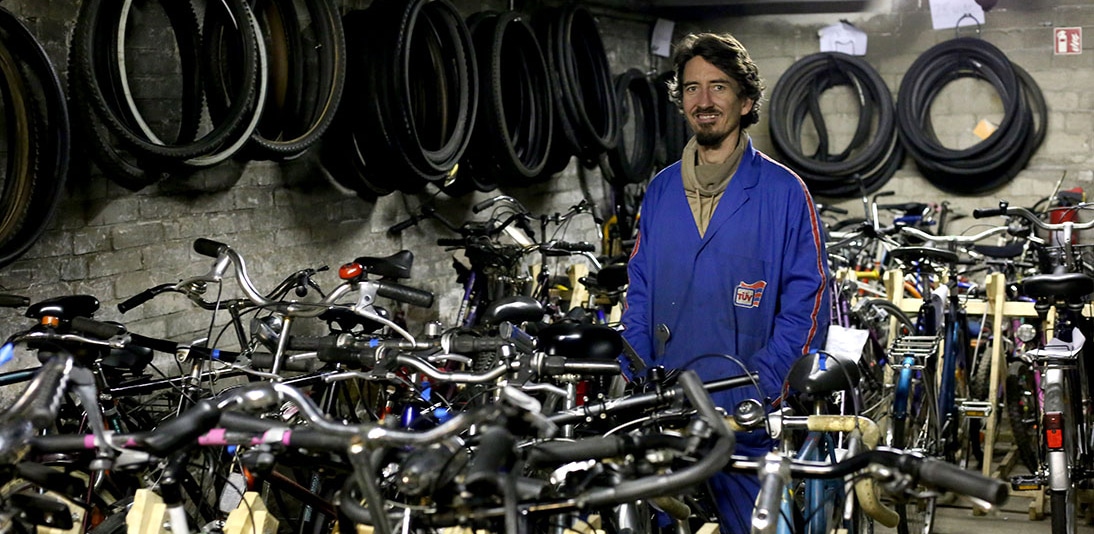If you can surf somebody’s couch why not a bicycle? This question prompted Graham Pope to create the bike sharing network, BikeSurf, which now covers seven cities in Europe.
“When I first arrived in Berlin [from Ireland] I didn’t have a bicycle, and this city is too big to walk everywhere. I didn’t want to pay 10 euro per day in rental shops. I thought there must be some kind of bicycle sharing project here but there wasn’t,” Pope says.
Taking a cue from the Couchsurfing model, which connects global travelers to locals who offer a place to stay, Pope and one other volunteer started the bike sharing project in June 2012. They began by offering three of their own bicycles to be used by visitors to the city for free, and with time others started to donate more bicycles and the project grew.
“We have 20 bikes in Berlin at the moment, in four different locations. Two years ago we had 40 in eight locations but had to scale down because every bicycle needs to be maintained regularly, and this takes time. And, volunteers keep the bicycles [at their homes or workplaces] — two to five bikes each — so it is also a space issue,“ says Pope.
Bicycles can be booked via the online platform. Since the bike locks they use are based on number code, when you choose a bike on the platform you get the location of the bike and the lock code. You also get an email reminder to return the bike on time.
Enthusiasts in other cities can easily join and offer their bicycles through the same platform. After seven-and-a-half years, the network can now be found in seven cities in four different countries: two other German cities, Freiburg and Darmstadt; Paris, France; Thessaloniki, Greece; and two Hungarian towns, Budapest and Egger.
“We give everybody who wants to join free access to the platform and also advise on how to use it. The only condition is that the platform can be used only for non-commercial purposes. While each city can decide the details of how they want to operate, if any money is exchanged, it has to go back for the project’s costs,” says Pope.
In Berlin, the program started out completely free of charge, but in time Pope realized they were not receiving enough donation money to be able to cover the costs of the activity. Today they charge a small fee — usually one to three euros per day.
“A one-way public transport ticket in Berlin costs almost three euros, so this is still a cheap option. If somebody doesn’t have that money, he or she can contribute in another way. [Maybe they] help us with website maintenance, for an example. We don’t want to encourage people to take without exchange — it’s not good for any sharing project. We try to gently teach people that we are volunteers, and that they cannot expect that we pay for bike locks and web hosting from our own pockets,” explains Pope.
The Bikesurf philosophy is, the more people are engaged, the more they feel like they are part of the project. Trust is of crucial importance and users have shown themselves to be very trustworthy. As of this moment, of 4,000 people using bikes in Berlin, only two Bikesurf bikes have been stolen by users.
“That’s a really small percentage; I expected it to be higher. It is a more common problem, for example, for somebody to leave the bike at the train station because that’s convenient for them, and then we have to go and search for the bike among thousands of bikes there,” says Pope.
Sometimes people who use the service meet with local volunteers and spend time with them, just like users of Couchsurfing. But if volunteers are too busy, the system functions even without people seeing each other.
“If something is free it doesn’t mean it has no value. For me, sleeping on somebody’s couch is more valuable than a hotel room — the experience is more valuable, ” says Pope, who also volunteers in another bicycle related sharing project, Rückenwind Bike Kitchen, which offers free bike repairs for the public and provides donated bicycles for refugees in Berlin.
“The goal is the same: Get more people on bikes!” Pope concludes.
Getting more people on bicycles not only promotes sharing among people, but also has other benefits for the whole society. For example, greenhouse gas emissions from traffic are still very high in Germany, and bicycles can be a valuable part of the solution, which makes project like Bikesurf even more important.









